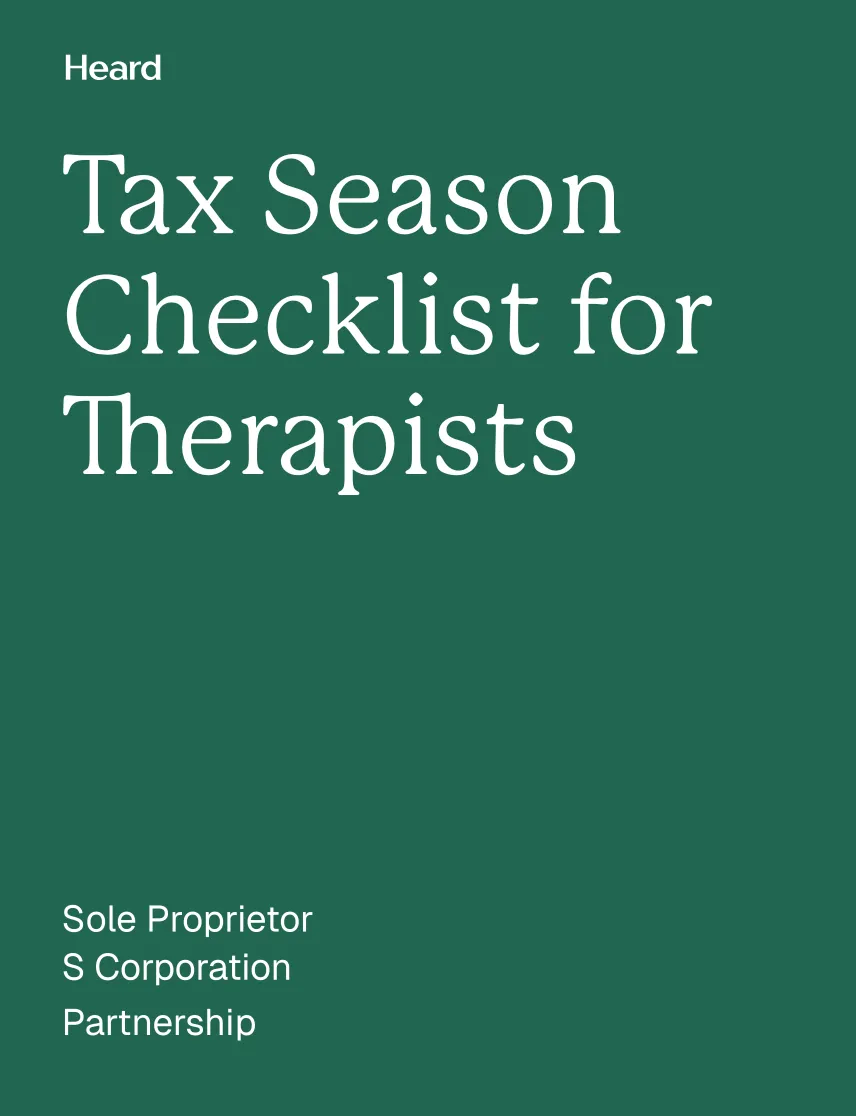This article has been updated for 2026.
When you run your own therapy practice, you have plenty on your to-do list; a surprise tax deadline—or a penalty due to late filing—is the last thing you need.
Below, you’ll find all the major federal tax deadlines for your therapy practice, divided up according to whether you have employees or pay contractors, and according to your business structure.
Remember: these are federal deadlines only. The deadlines for state taxes will vary according to the state (or multiple states) where you practice, plus factors such as whether your business is a registered LLC.
{{resource}}
For therapy practices paying quarterly estimated taxes
The deadlines for 2026 quarterly estimated tax payments are:
- April 15, 2026: Deadline for Q1 estimated tax payments
- June 15, 2026: Deadline for Q2 estimated tax payments
- September 15, 2026: Deadline for Q3 estimated tax payments
- January 15, 2027: Deadline for Q4 estimated tax payments
For therapy practices with employees or contractors
To learn more about the difference between employees and contractors, check out our guide to payroll for therapy practices.
February 2: Deadline to submit Form W-2s and Form W-3s to employees and the IRS.
February 2: Any contractors you paid more a total of $600 or more during the 2025 tax year must receive a copy (“Copy B”) of Form 1099-NEC or Form 1099-MISC by this date.
April 1: Deadline to file copies (“Copy A”) of Form 1099-NEC or Form 1099-MISC electronically with the IRS.
For sole proprietor therapists
As a sole proprietor, your individual person and your business are identical for tax reasons. Learn more about sole proprietor taxes for therapists.
April 15: Deadline to file Form 1040, your individual tax return. This is also the deadline to file Form 4868, requesting a six month extension.
For S corporation therapy practices
If your therapy practice is an S corporation, you must file both an individual tax return (reporting pass-through income) and an S corporation tax return (reporting S corporation income and distributions).
* March 16: Deadline to file Form 1120S, your S corporation tax return. This is also the deadline to file Form 7004, requesting a six month extension.
April 15: Deadline to file Form 1040, your individual tax return. This is also the deadline to file Form 4868, requesting a six month extension.
September 15: Deadline to file Form 1120S with an extension.
October 15: Deadline to file Form 1040 with an extension.
* For calendar year S corporations only. If your S corp follows a fiscal year, these forms are due on the fifteenth day of the third month after your fiscal year closes.
For partnership therapy practices
If your therapy practice is a partnership, you must file both an individual tax return (reporting pass-through income) and a partnership tax return (reporting partnership income and distributions).
* March 15: Deadline to file Form 1065, your partnership tax return. This is also the deadline to file Form 7004, requesting a six month extension.
April 15: Deadline to file Form 1040, your individual tax return. This is also the deadline to file Form 4868, requesting a six month extension.
September 15: Deadline to file Form 1065 with an extension.
October 15: Deadline to file Form 1040 with an extension.
* For calendar year partnerships only. If your partnership follows a fiscal year, these forms are due on the fifteenth day of the third month after your fiscal year closes.
{{resource}}
Therapist tax deadline FAQ
What should I do if I miss the filing deadline?
If you miss the filing deadline, file your taxes as soon as possible, even if you can’t pay them. The penalty for late filing isn’t huge, but the longer you leave it, the larger it becomes. You can learn more from our article on IRS penalties for therapy practices.
What if I can’t afford to pay my taxes?
If you can’t afford to pay your taxes, the IRS offers you a few options. You can:
- Apply for a 120 day extension, giving you more time to get the money together;
- Settle on an installment plan with the IRS (so long as you owe less than $50,000 in overdue taxes, penalties, and other fees); or
- Make an offer in compromise, in which case the IRS accepts a total lump sum lower than the amount you owe.
Our guide to IRS penalties for therapy practices covers these options in greater detail.
What happens if I realize I made a mistake on my tax return?
If you need to change information you submitted on your tax return, there’s no need to file a completely new return. Instead, file an amendment. The amendment only corrects the information you need to correct, without changing any other part of your original submission.
Amendment forms, according to business structure:
- Sole proprietors: Form 1040-X
- S corporations: Form 1120-X
- Partnerships: Form 1065-X
You have up to three years after the original due date of the return to file an amendment.
How do I file my tax return online?
If you are a sole proprietor with an adjusted gross income under $73,000, you can file your return for free online. If your income is higher, or if you have a different business structure, you may use commercial software approved by the IRS.
Who do I talk to if I need help filing my taxes?
For help filing taxes, you can hire a traditional financial services provider such as an accountant, Certified Professional Accountant, or Enrolled Agent. Or get in touch with the tax professionals at Heard. We specialize in helping therapists file their taxes accurately and on time.
—
This post is to be used for informational purposes only and does not constitute legal, business, or tax advice. Each person should consult their own attorney, business advisor, or tax advisor with respect to matters referenced in this post.
Bryce Warnes is a West Coast writer specializing in small business finances.
{{cta}}
Manage your bookkeeping, taxes, and payroll—all in one place.

Discover more. Get our newsletter.
Get free articles, guides, and tools developed by our experts to help you understand and manage your private practice finances.





